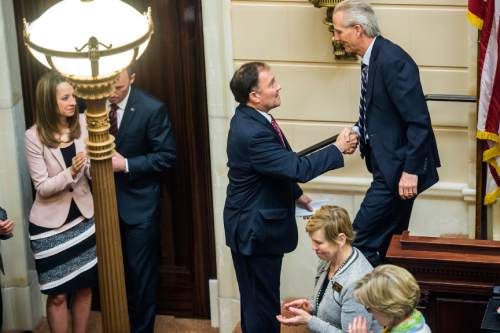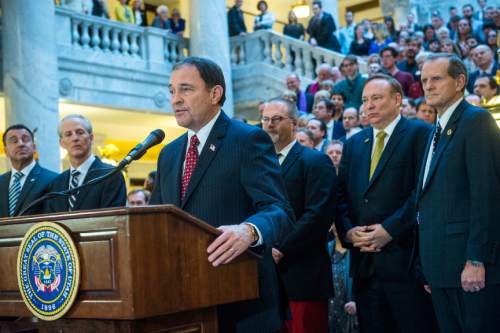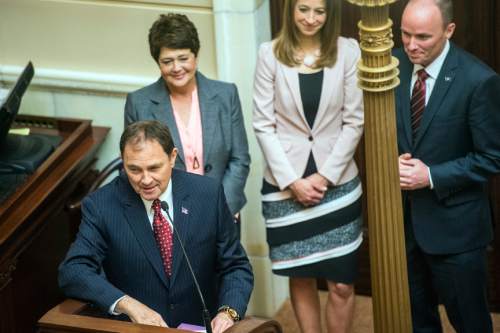This is an archived article that was published on sltrib.com in 2015, and information in the article may be outdated. It is provided only for personal research purposes and may not be reprinted.
Gov. Gary Herbert says he is closely studying whether to veto a bill that would block Utah regulators from imposing a seasonal wood-burning ban. But he says he will probably sign bills to reinstate execution by firing squad and to raise taxes.
During his monthly KUED news conference Thursday, he also warned that Utah could see water rationing this year after a dry winter. And he expressed optimism that a compromise on how to expand Medicaid for the poor will be reached soon.
HB396, to prevent the Utah Air Quality Board from banning wood burning, seems "a little bit of an overkill," Herbert said.
"I have a concern about [legislators] taking away the power of the air quality board" to do whatever is needed to reduce pollution.
While relatively few people have wood-burning stoves, the governor said, such burning creates 5 percent of particulate air pollution in the Salt Lake Valley. "It's a big number that impacts our air quality."
Herbert sparked a firestorm of opposition with a proposal to ban wood burning all winter in the seven-county swath of northern Utah, where fine-particulate pollution levels violate federal standards.
The Utah Air Quality Board held a series of public hearings in January during which wood stove and fireplace owners loudly objected to the ban, and the board backed away from the proposal.
"It's not a matter, in my mind, of not having a wood-burning ban. It's a matter of having the right wood-burning ban that makes some sense, that is enforceable," Herbert added. "I'm going to take a really hard look at" HB396.
The bill passed with a 56-12 majority in the House that, if it held, would be enough to override a veto. But with five members absent, senators approved the bill by a 17-7 margin, short of the 20 that would be needed for an override.
The governor said he will review all bills passed by the Legislature, but expects his staff to give him a list of 25 to 30 for closer scrutiny — and he expects the wood-burning ban to be among them.
One controversial bill he said he leans toward signing is HB11 to allow execution by firing squad if the state is unable to obtain drugs needed for lethal injections. Manufacturers of such drugs are trying to block their use in executions.
"The debate really is more than just the firing squad. It's should we have capital punishment or not," Herbert said. "We're one of 32 states that believe in capital punishment for the most heinous, despicable crimes."
When a death sentence is given, "We have to have the ability to carry that out," Herbert said. "We prefer lethal injection. … But we're finding it's hard to find those drugs that are necessary to perform lethal injection, so we need to have some kind of a fallback position. [The] firing squad is what we have chosen."
The death penalty is rare in Utah and has a "high bar as far as constitutional requirements," the governor said, adding that Utah has had seven executions in the past 40 years, and eight people are on death row now.
On other legislative issues, Herbert said he supports, and is leaning toward signing, bills to raise some taxes. That includes a measure to raise the state gasoline tax by 5 cents a gallon effective Jan. 1, and another to raise property taxes for education by $75 million.
Herbert also warned that little snowfall this winter may mean water rationing this summer.
"We're going to have to conserve," he said with reservoir levels averaging 60 percent to 65 percent of capacity and low snowpack.
"I can see the potential of rationing, [and] alternate days that we water our lawns," he said. "It's going to be a challenging summer unless we get some water."
The governor also expressed optimism that a compromise will come soon on expanding Medicaid. He said officials are looking at ways to resolve House concerns about having a program that is sustainable with predictable costs.
"Predictability and sustainability are the two issues that need to be addressed. I think there are answers and ways we can solve that problem, and give everybody comfort," he said. "I am optimistic we will find resolution this summer."
He said, "We may have to change the name to something else, not Healthy Utah," the moniker for his plan, while combining parts of his plan and one pushed by the House. "I have no pride of authorship on this, frankly. I just want to solve the problem."
Herbert said he is also happy with a method adopted on how to relocate the Utah State Prison — with a seven-member board making a recommendation, the governor calling a special session of the Legislature to approve or reject it, with the governor able to veto the bill.
"If there's a better place than Draper [the current site], we should find it. If there's not a better place than Draper, then let's keep it in Draper," he said. "We clearly are at the point where we need to rebuild the prison" because of its age and need for facilities that could support newer programs.
He said relocating also opens up "a very valuable piece of real estate for future development," where communities in Utah and Salt Lake counties are merging.







